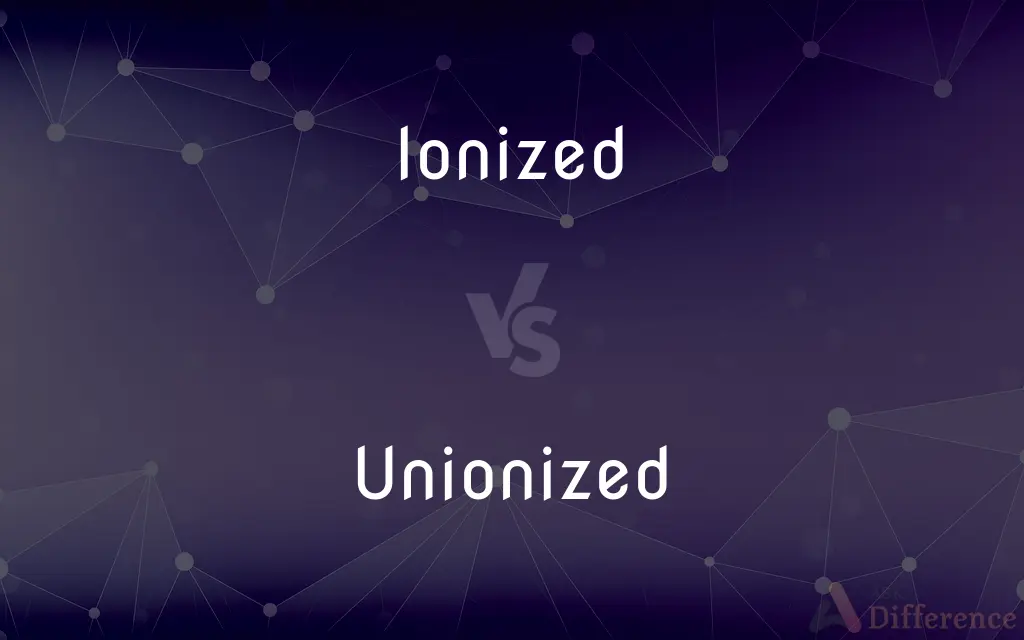Ionized vs. Unionized — What's the Difference?
By Fiza Rafique & Maham Liaqat — Updated on March 30, 2024
Ionized refers to atoms or molecules that have gained or lost electrons, acquiring a net charge. Unionized pertains to atoms or molecules in their neutral state, without any net electrical charge.

Difference Between Ionized and Unionized
Table of Contents
ADVERTISEMENT
Key Differences
Ionization is the process by which an atom or molecule gains or loses electrons, resulting in a charged particle known as an ion. This process can occur through chemical reactions, exposure to radiation, or high energy collisions. Unionized substances, however, remain in their stable, electrically neutral state, not undergoing any such process that alters their electron count.
While ionized particles are essential in various scientific and industrial applications, such as in the formation of plasma, conduction in electrolytes, and even in everyday devices like ionizers and air purifiers, unionized molecules are crucial in contexts where electrical neutrality is required, such as in non-reactive solvents or in the maintenance of a substance’s original chemical structure.
The presence of ionized particles can significantly alter the physical and chemical properties of a substance, including its conductivity, reactivity, and interaction with electromagnetic fields. Unionized substances, on the other hand, maintain their original properties unless subjected to conditions that cause ionization.
In biological contexts, the difference between ionized and unionized forms of molecules can greatly affect their absorption and distribution within organisms. For example, ionized drugs may have different solubility and absorption rates compared to their unionized counterparts, influencing their effectiveness and the way they are administered.
Comparison Chart
Electrical Charge
Has a net electrical charge (positive or negative)
No net electrical charge
ADVERTISEMENT
Formation
Through loss or gain of electrons
Maintains original electron count
Applications
Plasma, electrolytes, air purifiers
Non-reactive solvents, maintaining chemical structure
Properties
Altered conductivity, reactivity
Maintains original physical and chemical properties
Biological Impact
Different absorption and distribution in organisms
Stable absorption and distribution
Compare with Definitions
Ionized
Charged particles.
Ionized air purifiers capture pollutants through electrically charged filters.
Unionized
Maintains original properties.
Unionized compounds in air do not alter its conductivity under normal conditions.
Ionized
Formed by electron loss or gain.
Sodium becomes ionized by losing an electron to chlorine in salt formation.
Unionized
Stable electron configuration.
Unionized noble gases are chemically inert due to their stable electron configurations.
Ionized
Biological significance.
The ionized form of a drug may affect its solubility and how easily it can be absorbed by the body.
Unionized
Used in non-reactive applications.
Unionized solvents are preferred in reactions where ionic interference is undesirable.
Ionized
Essential in plasma formation.
Ionized gases in neon lights emit bright colors when electricity is applied.
Unionized
Electrically neutral molecules.
Unionized water molecules remain neutral, making them poor conductors of electricity.
Ionized
Alters properties.
Ionized water conducts electricity due to the presence of charged ions.
Unionized
Biological stability.
Unionized molecules in medications may pass through cell membranes more easily than their ionized counterparts.
Ionized
To convert or be converted totally or partially into ions.
Unionized
(of workers or their workplace) belonging to, or having workers belonging to, a trade union
Unionized factories
Ionized
Simple past tense and past participle of ionize
Unionized
To organize into a labor union.
Ionized
Converted totally or partly into ions. Opposite of nonionized and unionized.
Unionized
To cause to join a labor union.
Ionized
Converted totally or partly into ions
Unionized
To organize or join a labor union.
Unionized
Simple past tense and past participle of unionize
Unionized
Organized into a trades union or trades unions.
Unionized
Alternative form of un-ionized
Unionized
Not converted into ions
Unionized
Being a member of or formed into a labor union;
Organized labor
Unionized workers
A unionized shop
Common Curiosities
Why are some molecules unionized?
Some molecules remain unionized because they have not been exposed to conditions that would alter their electron count, maintaining electrical neutrality.
What causes a substance to become ionized?
Substances become ionized through the loss or gain of electrons, often induced by chemical reactions, radiation, or electrical forces.
Do ionized particles exist naturally?
Yes, ionized particles are found naturally, such as in lightning, the ionosphere, and within our bodies.
How does ionization affect a substance's properties?
Ionization can change a substance’s conductivity, reactivity, and interaction with electromagnetic fields.
What role do ionized substances play in technology?
Ionized substances are crucial in various technologies, including electronics, air purification, and energy generation.
How do unionized substances interact with electromagnetic fields?
Unionized substances generally do not interact strongly with electromagnetic fields due to their lack of net charge.
Why is the distinction between ionized and unionized forms important in biology?
The distinction affects how drugs and nutrients are absorbed, distributed, and excreted by organisms, influencing their biological effectiveness.
What is the significance of ionized water?
Ionized water, which has altered pH levels, is believed by some to offer health benefits, though scientific evidence is mixed.
Can a substance switch between ionized and unionized states?
Yes, a substance can switch between ionized and unionized states under different conditions, such as changes in pH, temperature, or electrical fields.
How do unionized substances contribute to chemical stability?
Unionized substances contribute to stability by resisting changes in their chemical structure and maintaining neutrality.
What is an ionizer, and how does it work?
An ionizer is a device that produces ionized particles, often used to purify air or water by attracting and neutralizing pollutants.
Why is ionization important in the atmosphere?
Ionization in the atmosphere affects weather patterns, radio wave propagation, and the formation of the auroras.
What are the health and safety considerations for handling ionized substances?
Handling ionized substances requires precautions to avoid exposure to harmful levels of radiation or reactive chemicals, emphasizing the need for protective equipment and safety protocols.
Can the ionization state of a molecule affect its environmental impact?
Yes, the ionization state can influence a molecule's solubility, mobility in the environment, and its interaction with living organisms, affecting its environmental impact.
How does the ionized form of a drug differ from its unionized form in medicinal chemistry?
The ionized form of a drug may be more soluble in water but less able to cross cell membranes than its unionized form, affecting its absorption and efficacy.
Share Your Discovery

Previous Comparison
Ethereal vs. Transcendental
Next Comparison
Baal vs. MolochAuthor Spotlight
Written by
Fiza RafiqueFiza Rafique is a skilled content writer at AskDifference.com, where she meticulously refines and enhances written pieces. Drawing from her vast editorial expertise, Fiza ensures clarity, accuracy, and precision in every article. Passionate about language, she continually seeks to elevate the quality of content for readers worldwide.
Co-written by
Maham Liaqat















































